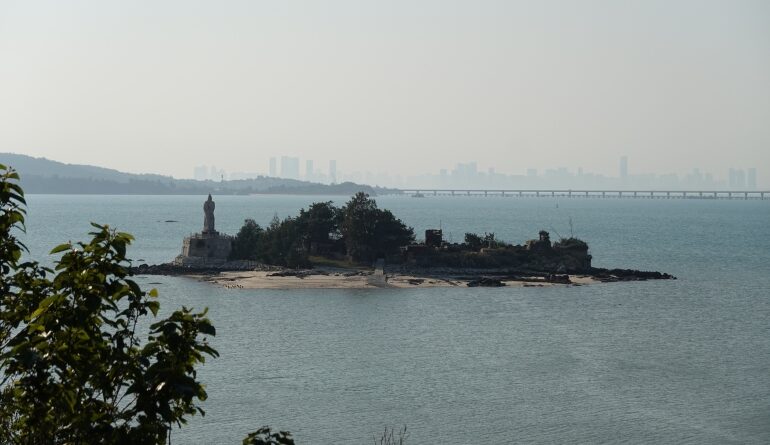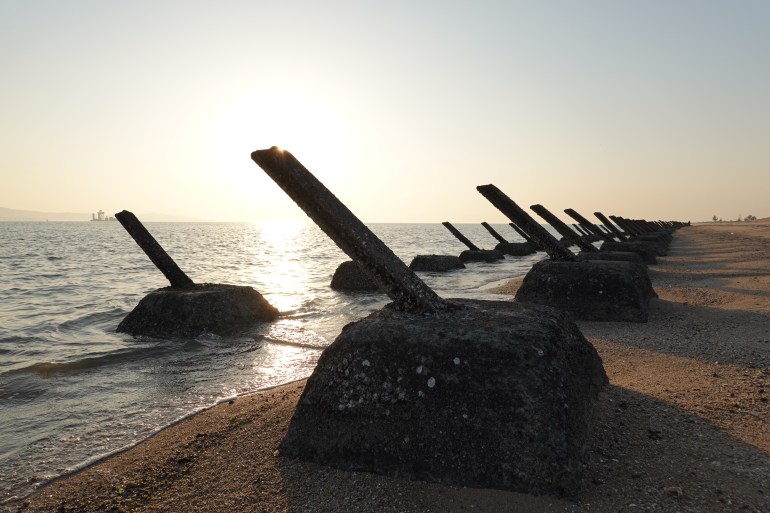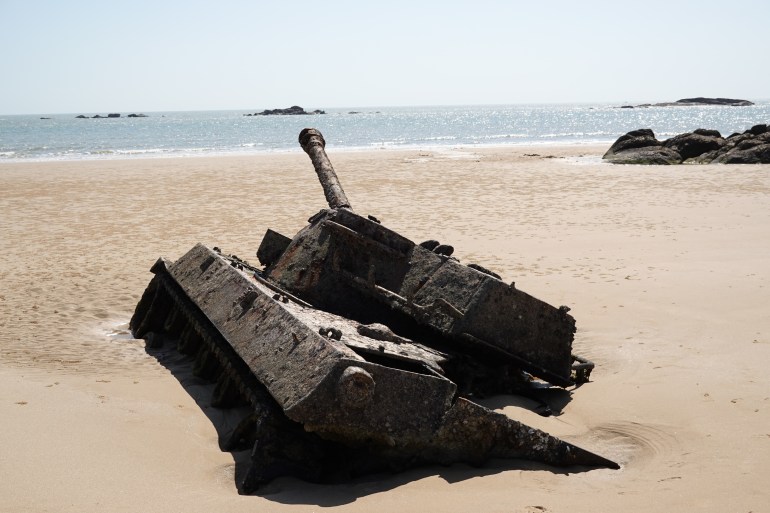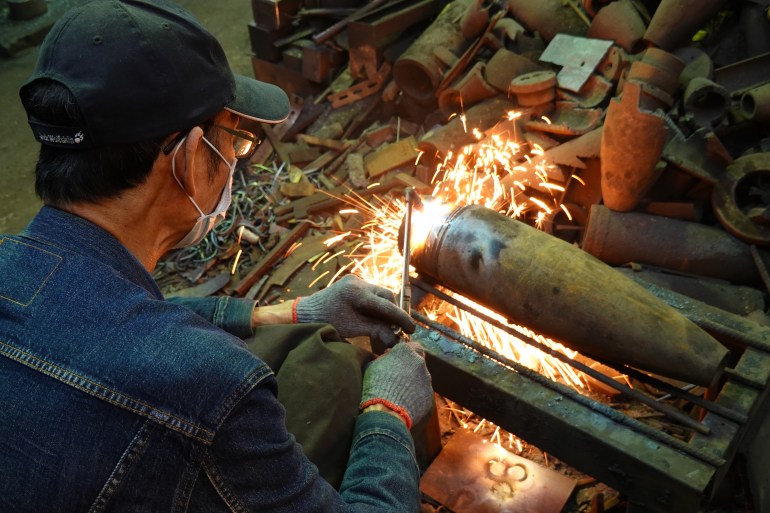
Kinmen Islands, Taiwan – A storm is raging on the small Taiwanese island of Kinmen.
On an empty beach along the island’s west coast, heavy waves pound a line of rusty defensive stakes, secured to concrete foundations, running like the spines of a hedgehog’s back along the stretch rocky coast
Further up the beach, despite the wild weather, Kinmen residents Robin Young and Ne-Xie Wang watch the waves crash against the shore. Behind them, the wind howls through the cracks of old military outposts and long-abandoned American-made tanks.
The fortifications once formed the backbone of the defenses of western Kinmen, where Taiwan proper is 200 km (124 miles) away and mainland China less than five (three miles) away.
As the storm sweeps a group of low clouds over the water, mainland China and the towers of the Chinese city of Xiamen emerge from the darkness.
With the wind threatening to rip off his jacket and mask, Young gestures toward Xiamen, then points to the beach.
“If the Chinese attack Taiwan, the first assault will come here.”
The drums of war
A Chinese assault on Kinmen is not a theoretical scenario.
At the end of the Chinese Civil War in 1949, Kinmen was among a group of outlying islands that remained in the hands of the defeated Nationalists, along with Taiwan itself. The Communists attempted to capture Kinmen twice, but both times were repulsed by Nationalist forces.
Instead, the Communists carried out an incessant artillery bombardment of Kinmen for more than two decades in an attempt to subdue the Nationalists and the people of Kinmen.
The skyline of the Chinese city of Xiamen is visible through the mist of Kinmen and the surrounding islets [Frederik Kelter/Al Jazeera]
At the same time, the nationalists effectively turned the island into a military colony where the number of soldiers sometimes exceeded the total population of about 100,000 Kinmenese.
It was only when Taiwan became democratized that Kinmen began to open up, first to the rest of Taiwan, and at the turn of the century to Chinese tourists as well.
But in recent years, tensions between China and Taiwan have risen steadily again, and with US House Speaker Nancy Pelosi’s visit to Taiwan on August 2, the situation has turn into the worst crisis between the two countries in more than 25 years.
The Chinese responded to Pelosi’s visit by conducting their largest military exercises in the Taiwan Strait and sending missiles across the main island of Taiwan.
Tanks were deployed on the beaches of Xiamen and Taiwan pushed back drones sent to Kinmen by Chinese forces.
Ne-Xie Wang takes a short walk from the beach to Jincheng, Kinmen’s largest city, not far from where the former aircraft maintenance technician was born and raised.
He laments the state of affairs between China and Taiwan and fears trouble ahead: “The relationship has deteriorated very rapidly in recent years.”
For Wang, 56, the situation today echoes his childhood, when he and his friends would have to rush to the nearest bomb shelter every time the Chinese fired an artillery barrage on island
“In my view, both sides should do everything in their power to prevent further escalation,” he says.
“Otherwise, I’m afraid the Kinmenians will be the first to pay a heavy price.”
 The beach on the west coast of Kinmen there are defensive stakes. In the past, the number of soldiers stationed on the island exceeded the civilian population [Frederik Kelter/Al Jazeera]
The beach on the west coast of Kinmen there are defensive stakes. In the past, the number of soldiers stationed on the island exceeded the civilian population [Frederik Kelter/Al Jazeera]
Su Ching Song was born in Kinmen, but has lived in Taiwan’s capital, Taipei, for 15 years since moving there to study at university.
He also fears that his native Kinmen will be the first victims of the growing tensions.
“I don’t think the Taipei government is blameless if it ends up in a Chinese attack,” he said over WhatsApp, offering Pelosi’s visit as an example.
“The DPP (Democratic Progressive Party) government in Taipei must have known that her visit would provoke a strong response from China, but they let her come anyway. I can’t stand the aggressive Chinese response, but the DPP at the same time despises it very much China’s red lines and the Sino-Taiwanese relationship will not improve if both sides intentionally provoke each other.
‘small fish’
Fisher Kuan-Lin Yu wishes he could go back to a time when cross-Taiwan Strait relations were less politically charged.
He then worked as a driver and tour guide for Chinese tourists coming to Kinmen. That ended when the borders were closed after the first outbreak of COVID-19 in Wuhan, and Yu went back to fishing.
“Before the current Taipei government came to power [in 2016]China and Taiwan seemed to be getting closer for the benefit of everyone, including the Kinmenese,” he said.
At the same time, Yu understands why the relationship has deteriorated.
 An American-made Taiwanese tank abandoned in the sand on a beach on the southern coast of Kinmen
An American-made Taiwanese tank abandoned in the sand on a beach on the southern coast of Kinmen
[Frederik Kelter/Al Jazeera]
Beijing claims Taiwan as its own territory and has taken an increasingly assertive approach to the island since the election of Tsai Ing-wen of the DPP, who opposes unification. He won a second electoral victory in a landslide in 2020.
Even before this month’s military exercises, Beijing had been sending warplanes into Taiwan’s air defense zone regularly. He has not ruled out the use of force to take the island and reiterated that threat in a white paper published on Wednesday.
“With the DPP government’s flirtation with formal Taiwan independence on the one hand and Chinese meddling in Hong Kong and its aggressive rhetoric towards Taiwan on the other, I understand why both sides have trouble seeing eye to eye these days,” Yu said.
“Still, I’d rather the Chinese spend their money here than (on) their artillery munitions.”
Wu Tseng-dong holds one of these munitions in his arms in his workshop in downtown Kinmen.
“It was a gift from Chairman Mao,” he quips, laughing before setting the shell down.
The artillery shell is empty and is just one of hundreds of thousands that hit Kinmen during decades of Chinese bombing.
Wu crafts the steel from ancient Chinese shells into kitchen knives, which he sells in his workshop.
“It’s about turning war and conflict into something constructive,” he says before going to work with a cutting torch on the shell.
Less than 30 minutes later, Wu has turned it into a knife.
“I see what I do here as a symbol of peace at a time when we are moving dangerously close to war.”
 Wu makes a kitchen knife from an ancient Chinese shell [Frederik Kelter/Al Jazeera]
Wu makes a kitchen knife from an ancient Chinese shell [Frederik Kelter/Al Jazeera]
For Kinmen, there are legitimate reasons for concern, according to Chen Fang-Yu, who is an assistant professor at Taipei’s Soochow University and studies political relations between Taiwan, China and the United States.
He says that while China now possesses ballistic missiles and aircraft carriers, which diminish Kinmen’s strategic importance as a launch pad for any invasion of Taiwan, the island retains symbolic importance.
“As tensions rise between China and Taiwan, the leadership of the Chinese Communist Party[PCC]could end up in a situation where they need a tangible victory in the taiwan strait but are not ready for a full assault on taiwan. In this scenario, seizing the largely demilitarized outlying Taiwanese islands of Kinmen and Matsu could provide a symbolic victory for the CCP; similar to what Russia did with Crimea in 2014”. [CCP[mightendupinasituationwheretheyneedatangiblewinintheTaiwanStraitbutarenotreadyforanall-outassaultonTaiwanInthatscenarioseizingthelargelydemilitarisedoutlyingTaiwaneseislandsofKinmenandMatsucouldprovideasymbolicvictoryfortheCCP;akintowhatRussiadidwithCrimeain2014”
Kuan-Lin Yu prays that Kinmen will not suffer the same fate as Crimea, which was annexed by Moscow.
“But that’s not really in my hands or the hands of the Kinmenians. We’re just a small fish in a strait of leviathans.”
[ad_2]
Source link





